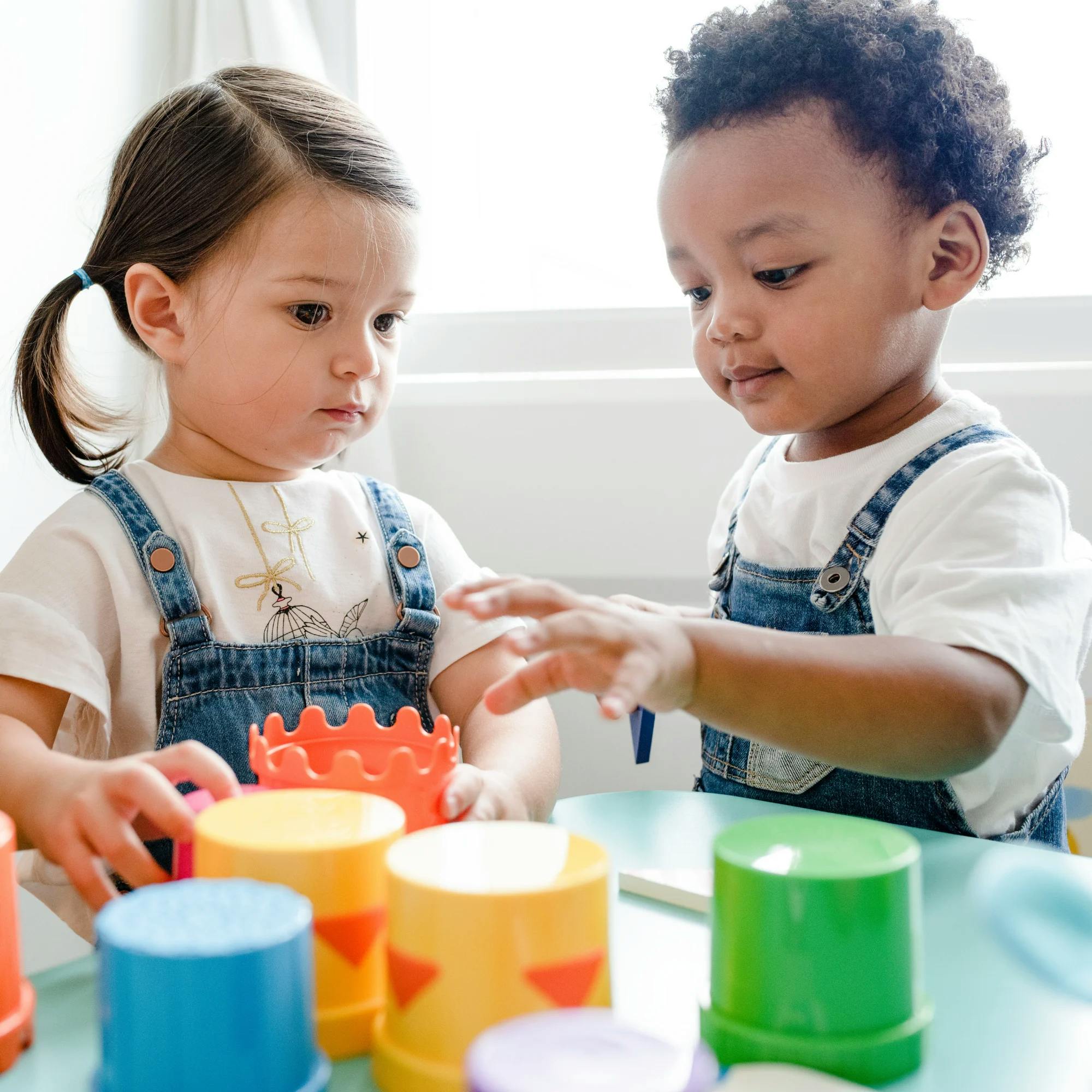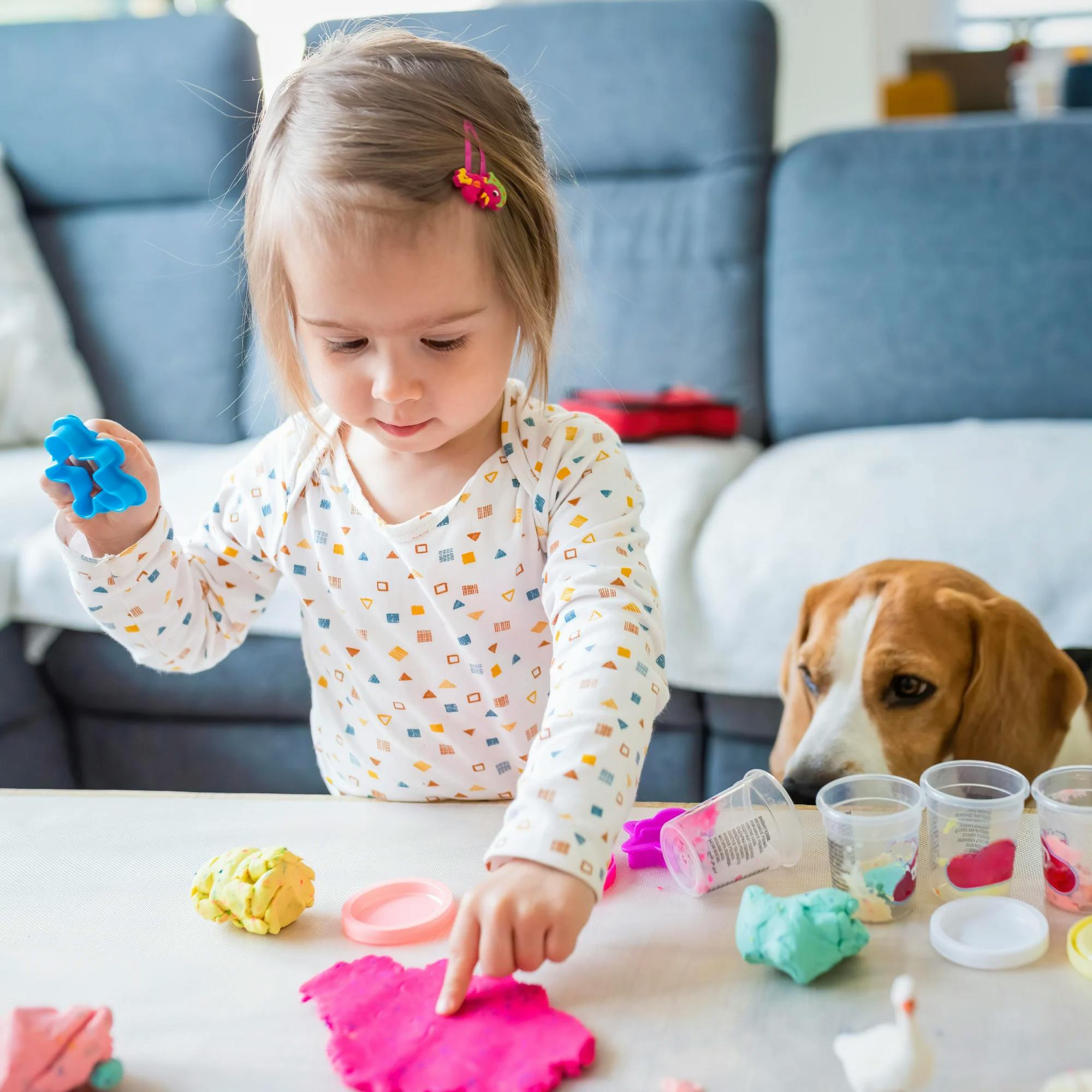
What to Do If Your 2- or 3-Year-Old Isn’t Talking
 Abby Barnes, M.S., CCC-SLP
Abby Barnes, M.S., CCC-SLP
If your 2-year-old or 3-year-old isn’t talking yet, you’re not alone—and you’re not doing anything wrong. It’s a common concern we hear from families: “Is it normal for my 2-year-old not to talk?” “Should I worry if my 3-year-old is babbling but not talking?”
While it’s natural to feel concerned, the good news is there’s a lot you can do to help your child. In this article, we explain why your 2-year-old or 3-year-old might not be using many words, when to seek support, and how speech therapy can help. Whether your toddler understands you but doesn't talk, your child babbles more than talks, or you're wondering about autism, let’s take this one step at a time, together.
Is your child on track?
Take our free screener to learn more about your child's development and whether a speech evaluation is recommended.
 Screener for children
Screener for childrenWhy is my 2-year-old or 3-year-old not talking?
If your 2-year-old or 3-year-old isn’t talking yet, it may be a sign of a speech or language delay. A speech delay means that a child is not developing spoken words and sentences at the expected pace for their age. It doesn’t necessarily mean there’s something “wrong,” but it is a cue to take a closer look at their communication development.
It’s important to remember that not all toddlers follow the same timeline. Some children may be late talkers but still catch up on their own. Others may benefit from early support to build their communication skills.
In some cases, not talking by age 2 or 3 could be related to an underlying condition. For example, hearing problems, autism spectrum disorder, or oral-motor challenges can all affect a child’s ability to speak clearly or consistently. We explain these in more detail below. But speech delays can also occur on their own, without any other diagnosis.
My toddler isn’t talking, but they understand everything
If you have a 2- or 3-year-old who isn’t using words but seems to understand everything, it may be that their receptive language–what they understand of spoken language–is developing well. Alexis Irazoque, M.S., L/SLP, an Expressable speech therapist, explains that in this case, an expressive language delay may be present. “An expressive language delay means that the way a child communicates and speaks is not meeting age-expected norms,” she says.
The good news? With early attention and the right support, most children with language delays make excellent progress. Let’s look at when children typically start talking and signs of a delay to watch for.


When do children usually start talking?
Most babies say their first words around 12 months of age. Some may talk a little earlier, while others take a bit more time, and that’s OK. Every child’s development is different.
However, before children begin talking, there are several important communication skills they need to develop first. Think of speech and language like a staircase: Each step builds on the one before it.
Here are some of the early milestones that come before talking:
Using gestures (such as pointing, waving, or raising arms to be picked up)
Imitating sounds, actions, or facial expressions

If your 2-year-old or 3-year-old isn’t talking, they may still be working on one or more of these earlier skills. This is why you might notice that your 2-year-old isn’t talking but babbling, or your toddler understands what you're saying while not speaking themselves. These are important clues that can help guide your next steps.
Understanding where your child is on this “staircase” can help you know how to support them. In the next section, we’ll explore some common reasons children may talk later than expected.
Why would a 2-year-old or 3-year-old be nonverbal?
There are a number of reasons a toddler might be a late talker. Some are temporary and easy to support, while others may need more attention.
Here are some common causes for a toddler to be nonverbal:
Hearing problems
If a child has trouble hearing, they may also have trouble learning to talk.
They might not hear all the sounds clearly or miss parts of words.
This can make it harder to imitate speech or learn new vocabulary.
If your child isn’t talking yet, it’s important to rule out hearing loss early with a hearing test.
Oral-motor difficulties
Some children have trouble moving their lips, tongue, or jaw the way they need to in order to speak.
This can happen with a condition like childhood apraxia of speech, which affects how the brain plans and coordinates speech movements.
These children may know what they want to say, but struggle to get the words out clearly.


Learning differences and autism
A speech delay can happen on its own, or it may be part of a larger developmental difference.
Some toddlers who aren’t talking may also have autism, ADHD, or a learning disability.
If your toddler has a hard time making eye contact, using gestures, or responding to their name, these may be early signs of autism.
Take a look at these articles to learn more about signs of autism in a 2-year-old and 3-year-old.


Neurological problems
Certain medical conditions that affect the brain or muscles can impact speech development. This includes cerebral palsy, muscular dystrophy, or a traumatic brain injury. These conditions can affect a child’s ability to control the muscles needed for speech.
Limited language exposure or playtime
Kids learn to talk by hearing and interacting with others throughout the day.
If a child doesn’t have enough opportunities to play, hear language, or engage with caregivers, it may slow down their speech development.
Too much screen time can also get in the way of valuable face-to-face communication.
Developmental delays with unknown cause
Sometimes, a child may have a speech delay without any clear reason. They may be developing more slowly in this one area, even though other skills seem on track. These children often make excellent progress with early intervention and support.


How do I know if my toddler needs speech therapy?
It’s normal to wonder if your toddler is on track, especially when you hear other kids their age chatting away. Here's the truth: If your child is 15 months old and still not saying any words, it’s a good idea to check in with a speech-language pathologist. And if your 2-year-old or 3-year-old isn’t talking at all (or only says a few words), it’s time to seek help.
“Even if your toddler isn’t talking but understands what you say, or they’re babbling but not using real words, an early speech evaluation can make a big difference,” says Irazoque. A speech therapist will assess how your child is communicating and help you figure out the best next steps.
Why early intervention matters
When speech and language delays aren’t addressed, it can affect the child’s learning, social skills, and confidence later on. That’s why early intervention, or starting speech therapy early, is so important. The earlier we start, the more progress your child can make, and the easier it is to catch up.
It’s never too late to start speech therapy
If you're just now realizing that your toddler may need support, don’t stress about what’s already happened. What matters is what you do next. The fact that you’re here, learning, and looking for answers means you’re doing an amazing job. You are your child’s biggest advocate, and this step could be life-changing for them.
Looking for a speech therapist?
Teletherapy makes it easy. We serve families with a range of speech, language, and feeding needs across the U.S. Get started today!
 Find a speech therapist
Find a speech therapistWhat can I do at home to help my toddler talk?
You may be wondering what else you can do alongside speech therapy. Good news: There is a lot you can practice with your toddler at home! Irazoque says, “I always tell parents how easy—and fun—practice can be. And it doesn’t take any big changes or expensive devices, just simple, everyday interactions.”
Let’s look at four things you can start trying today to help your 2-year-old or 3-year-old talk.
1 Get down to their level and play
Many people don’t realize that play is such a huge part of a child’s development. Did you know that play mimics communication? When we play with someone, one person takes a turn, then the other person, and so on. These back-and-forth actions are similar to communication.
Taking the time to play with your child can make a big difference in their speech and language development! If you’re not sure where to start, try these fun and practical playtime ideas. Or take a look at our recommended toys for 3-year-olds.


2 Make time to read together every day
Spending time reading with your little one can have amazing benefits for their communication skills! Children who are read one book a day are exposed to 78,000 extra words per year. How incredible is that?
Reading together allows your child to learn more words, understand how sentences are structured, and even increase their phonological awareness skills. This refers to a child’s ability to recognize the sounds that make up words and their meanings. These speech and language abilities are linked to a child’s academic abilities as they grow older.
Plus, reading together helps strengthen the bond you have with your child. So make storytime part of your daily routine!
Quick demo: How to read a book to your child like a speech therapist
Watch here3 Practice imitation skills
Being able to imitate sounds is important for a child’s speech and language development. If your child isn’t yet mimicking any sounds, then spend some time practicing animal sounds, or the sounds of trains and cars. They tend to be fun and motivating for toddlers to copy!
Once your child is imitating these sounds, you can move onto speech sounds such as vowels and consonants–think simple babbles like “ma-ma.” As your child improves in this area, you can move on to simple word imitation.
If you’ve tried all of this and your child is still struggling with verbal imitation, try gesture imitation. Children have to learn to copy gestures and movements before moving on to speech. These can be simple gestures such as waving, blowing kisses, and clapping hands.
4 Model language for your child
One of the most simple and effective things you can do for your kiddo is to model language for them. It’s easy: Just talk to them often, even if they don’t respond to you. Children learn so much from the people they spend the most time with. Your child can learn words, the meaning of words, and how to pronounce them simply just by watching and listening to what you do!
You’re not alone on this journey
As your child’s caregiver, you have one of the most powerful roles in their development. And if your 2-year-old or 3-year-old isn’t talking, know this: Seeking help early can make all the difference. You're already on the right track by looking for answers. At Expressable, we’re here to walk with you every step of the way. We’ve helped thousands of families around the country, and we’d be honored to support yours, too. Here’s just one example of a review from a family we've served:
“Ms. Katheryn was professional, very informative, friendly, honest, and really took the time out to help me, the parent, understand my daughter’s speech delay. She even gave me simple and daily tips to use with her that will help increase her communication and comprehension skills. Thank you for being a great support person!”
Whether your toddler isn’t talking yet, is only babbling, or seems to understand everything but says very little, we can help you figure out what’s going on and what to do next. Remember, it’s never too early (or too late) to get support.
Take the next step
Take our free screener to get quick insights into your child’s communication skills
Find a speech therapist who fits your family’s needs
Learn more about speech delays in toddlers and what to look out for
Frequently asked questions (FAQs)
What should I do if my 2-year-old or 3-year-old isn't talking yet?
If your child is age 2 or older and not talking, it's important to contact a speech therapist. Early help can make a big difference. Get matched with a speech therapist who can evaluate your child’s skills and recommend next steps.
Why would a 2-year-old or 3-year-old be nonverbal?
Speech and language delays can happen for many reasons. Causes might include hearing problems, autism, issues with how the child moves their mouth, a learning disability, neurological problems, or the child's environment.
Is it normal for a 2-year-old not to talk?
While toddlers typically say their first word at around 12 months old, children develop at their own pace. However, if your child is 15 months old and still not saying words, you may want to contact a speech therapist for an evaluation.
What are signs of autism in a 2-year-old or 3-year-old?
Just because a child has a speech delay does not mean they are autistic. However, a speech delay is one sign of autism. Other signs include limited gesturing such as waving or pointing, limited eye contact, or difficulty responding to their name. Learn more about signs of autism in a 2-year-old here.
Key takeaways
Most children say their first word at around 12 months of age.
If a 2-year-old or 3-year-old isn’t talking yet, they likely have a communication delay and should have a speech evaluation. Early intervention can make a big difference.
If a child understands everything but isn’t using many words, they may have an expressive language delay.
There are ways you can help your child talk more at home, such as playing, reading together, and encouraging them to imitate you.
How Expressable Can Help
Concerned your child isn't reaching age-expected milestones? Looking for communication support from a professional? Expressable is a national online speech therapy practice serving children and adults. We treat all major areas of communication and feeding, offer flexible hours including evenings and weekends, and accept most major health insurance plans. We’re proud to have earned more than 3,000 5-star reviews from our clients (4.9/5 average).
Our therapy model is centered on parent and caregiver involvement. Research proves that empowering caregivers to participate in their loved one’s therapy leads to better outcomes. That’s why we combine live, 1-on-1 speech therapy with personalized education and home practice activities for faster progress.
Communication is more than words. It’s how we share how we feel and show who we are. We’re here to help you or your child do just that.







